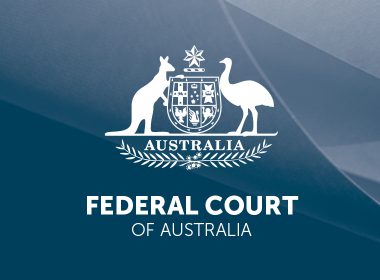Key decisions
- Construction, Forestry, Maritime, Mining and Energy Union v Fair Work Ombudsman (Cross River Rail Appeal) [2024] FCAFC 1
INDUSTRIAL LAW
Whether primary judge erred in finding visitor entry and conduct requirements were occupational health and safety requirements for purposes of s 499 of the Fair Work Act 2009 (Cth) – whether primary judge erred in finding breach of s 500 – penalties to be redetermined.
Construction, Forestry, Maritime, Mining and Energy Union v Fair Work Ombudsman (Cross River Rail Appeal) [2024] FCAFC 1 (Halley, Goodman and McElwaine JJ)
In Construction, Forestry, Maritime, Mining and Energy Union v Fair Work Ombudsman (Cross River Rail Appeal) [2024] FCAFC 1 (‘CFMMEU v FWA’), Mr Dean Rielly (the Second Appellant) was employed by the Construction, Forestry, Maritime, Mining and Energy Union (the First Appellant) (‘CFMMEU’) as a union official and state organiser. On 1 July 2021, Mr Rielly attended the Brisbane Cross River Rail Construction Project Worksite (the ‘Worksite’). In his capacity as a permit holder pursuant to ss 497 and 500 of the Fair Work Act 2009 (Cth) (‘FW Act’), Mr Rielly produced a notice under s 119 of the Work, Health and Safety Act 2011 (Qld) (‘WHS Act’). The notice detailed Mr Rielly’s suspicions that the person conducting a business or undertaking (‘PCBU’) at the Worksite was in breach of its statutory obligations under s 19(3) of the WHS Act (at [5]). On entering the Worksite, ‘Mr Rielly refused to sign-in or undertake a written site induction and was not given an oral sign-in or induction’ (at [6]).
Procedural history
Following the visit, proceedings were commenced in the Federal Circuit and Family Court of Australia (Division 2) by the Australian Building and Construction Commissioner (‘Commissioner’) (at [2]). The Commissioner asserted ‘that Mr Rielly contravened s 499 of the FW Act by failing to comply with reasonable requests made by the occupier of the worksite … to comply with occupational health and safety (OHS) requirements’ (at [2]). The functions of the Commissioner were assumed by the Fair Work Ombudsman (the Respondent) (‘FWO’) on 6 February 2023 following the abolition of the Australian Building and Construction Commission (at [2]).
On 21 February 2023, the primary judge upheld the majority of the FWO’s claim and ‘made declarations of contravention of ss 499 and 500 of the FW Act and determined that pecuniary penalties should be imposed and adjourned for further hearing the penalty quantum’ (at 3]; See further Fair Work Ombudsman v Construction, Forestry, Maritime, Mining and Energy Union [2023] FedCFamC2G 101 (‘Liability Judgment’)). Specifically, the primary judge held that Mr Rielly disobeyed instructions and requests made to him by employees of the occupier of the Worksite such as (at [13]; See also Liability Judgment at [31] and [33]):
- not to enter the tower crane pad;
- to leave the tower crane pad;
- not to enter the restricted area; and
- to leave the restricted area;
in circumstances where the purpose of each was to ensure that Mr Rielly ‘did not suffer an injury on-site’.
On 29 June 2023, penalties were imposed on the CFMMEU for $37,500 and Mr Rielly for $5,500 under ss 546(1) and (3) of the FW Act (at [3]; See also Fair Work Ombudsman v Construction, Forestry, Maritime, Mining and Energy Union (No 2) [2023] FedCFamC2G 564 (‘Penalty Judgment’). On 26 July 2023, the appellants lodged a Notice of Appeal challenging both the Liability Judgment and the Penalty Judgment (at [4]). The matter was heard by the Federal Court of Australia Full Court (‘FCAFC’).
Grounds of appeal
In total, the CFMMEU and Mr Rielly advanced nine grounds of appeal. The first three grounds concerned the trial judge’s findings that the Visitor Entry Requirements of the PCBU were an occupational health and safety requirement under s 499 of the FW Act and [that] those requirements were reasonable (at [15]). Grounds 4 to 7 concerned the trial judge’s findings that Mr Rielly failed to comply with the Visitor Entry Requirements and he failed to comply with the requests of the employees of the PCBU (at [15]).
Ground 8 asserted the trial judge erred in finding that Mr Rielly breached s 500 of the FW Act and the trial judge should have found that Mr Rielly exercised his right of lawful entry (at [15]). Ground 9 was contingent on whether some of Grounds 1 to 7 were successful and, if this were the case, the trial judge erred by taking into account irrelevant considerations when assessing the appropriate penalty (at [15]).
OHS requirements ‘did not cease to have that character because on the evidence their enforcement was not uniform as between workers, visitors and union permit holders’.
Statutory provisions
Before examining the findings of the appeal, it is helpful at this point to consider some of the applicable legislative provisions that apply in this case. Section 499 of the FW Act provides:
‘Occupational health and safety requirements
A permit holder must not exercise a State or Territory OHS right unless he or she complies with any reasonable request by the occupier of the premises to comply with an occupational health and safety requirement that applies to the premises.’
Section 500 of the FW Act provides:
‘Permit holder must not hinder or obstruct
A permit holder exercising, or seeking to exercise, rights in accordance with this Part must not intentionally hinder or obstruct any person, or otherwise act in an improper manner.’
Outcome of appeal
Grounds 1-3
On Ground 1, the FCAFC held there was no error made by the trial judge. The appellants’ argument was ‘that because the sign-in and induction practice was not insisted upon with respect to all contractors and visitors to the site, it did not amount to an OHS requirement that applies to the premises within the meaning of s 499 of the FW Act’ (at [31]). The FCAFC rejected that argument on the basis that the OHS requirements ‘did not cease to have that character’ even though ‘their enforcement was not uniform as between workers, visitors and union permit holders’ (at [31]).
On Grounds 2-3, the appellants argued ‘that the entry requirements operated to impede or hinder the exercise of Mr Rielly’s right of entry’ (at [38]). The FCAFC rejected that submission as Mr Rielly did not proffer evidence to that effect before the primary judge nor was that proposition put to the FWO witnesses in cross-examination (at [38]).
Grounds 4-7
The FCAFC dismissed Ground 4 of the appeal as ‘there was evidence to support the finding of the primary judge that a request was made of Mr Rielly not to enter upon the tower crane pad’ (at [51]). While there were some inconsistences between the accounts of the FWO witnesses as to whether Mr Rielly was requested to ‘come down’ from the tower pad, the FCAFC held (at [51]):
‘it was open to the primary judge to find in accordance with the evidence of Mr Bekkers who had a positive recollection of making a request to that effect which was unshaken in cross-examination that he had done so.’
Ground 5 asserted that Mr Rielly failed to comply with a reasonable request not to enter the site ‘unaccompanied’ (at [52]). It was accepted by the FWO witnesses that Mr Rielly was within their sight at all times (at [52]). Despite this concession, the FWO asserted that Mr Rielly was still unaccompanied on site as he was merely followed rather than accompanied (at [53]). The appellants succeeded on this ground as the FCAFC held the relevant WHS policy stated in the Visitor Induction Declaration required the visitor to be ‘accompanied’ when on site (at [53]). Specifically, the FCAFC held that ‘[a]s a matter of ordinary language, “accompany” has shades of meaning: primarily to go in company. It does not require one to be escorted; a more rigid and formal form of accompanying another …’ at [53]). Consequently, it was not open to the trial judge to find that it was a requirement for Mr Rielly to be ‘escorted’ (at 53]).
Grounds 6 and 7 concerned whether the trial judge erred in failing to assess whether the requests to comply with the Visitor Conduct Requirements were reasonable and whether the trial judge erred in finding that Mr Rielly had contravened s 499 (at [15]). Here, the FCAFC held the appellants enjoyed partial success on Grounds 6 and 7 due to its earlier finding in upholding Ground 5 but otherwise failed as to the balance (at [54]).
The FCAFC found that on Ground 8 the appellants did enjoy some partial success. This was because a finding that Mr Rielly breached s 500 rested on ancillary findings of contraventions of s 499 of the FW Act, some of which were erroneous (at [57]).
Ground 9 was left open as it concerned the imposition of pecuniary penalties. As the appellants enjoyed some degree of success on the appeal, the FCAFC held it would need to redetermine the amount of the pecuniary penalties following further submissions from the parties (at [58]).



